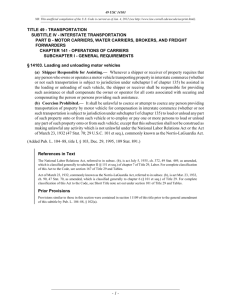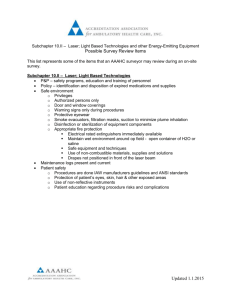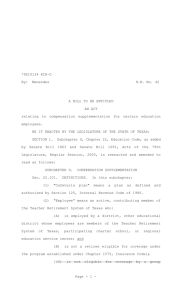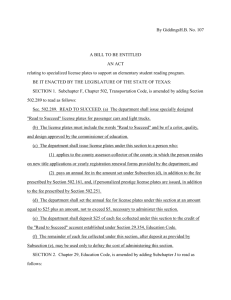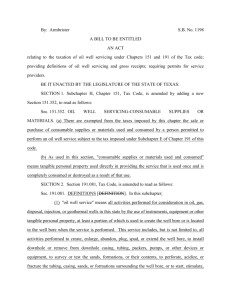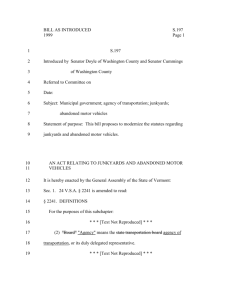By SiebertH.B. No. 1524 A BILL TO BE ENTITLED AN ACT relating
advertisement
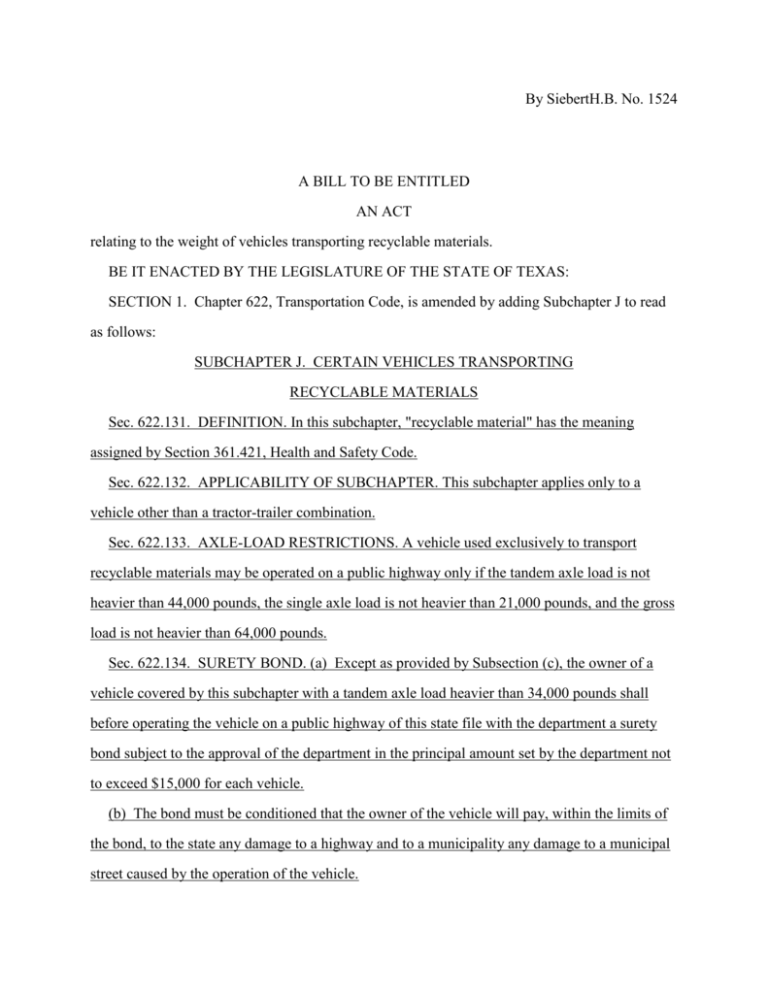
By SiebertH.B. No. 1524 A BILL TO BE ENTITLED AN ACT relating to the weight of vehicles transporting recyclable materials. BE IT ENACTED BY THE LEGISLATURE OF THE STATE OF TEXAS: SECTION 1. Chapter 622, Transportation Code, is amended by adding Subchapter J to read as follows: SUBCHAPTER J. CERTAIN VEHICLES TRANSPORTING RECYCLABLE MATERIALS Sec. 622.131. DEFINITION. In this subchapter, "recyclable material" has the meaning assigned by Section 361.421, Health and Safety Code. Sec. 622.132. APPLICABILITY OF SUBCHAPTER. This subchapter applies only to a vehicle other than a tractor-trailer combination. Sec. 622.133. AXLE-LOAD RESTRICTIONS. A vehicle used exclusively to transport recyclable materials may be operated on a public highway only if the tandem axle load is not heavier than 44,000 pounds, the single axle load is not heavier than 21,000 pounds, and the gross load is not heavier than 64,000 pounds. Sec. 622.134. SURETY BOND. (a) Except as provided by Subsection (c), the owner of a vehicle covered by this subchapter with a tandem axle load heavier than 34,000 pounds shall before operating the vehicle on a public highway of this state file with the department a surety bond subject to the approval of the department in the principal amount set by the department not to exceed $15,000 for each vehicle. (b) The bond must be conditioned that the owner of the vehicle will pay, within the limits of the bond, to the state any damage to a highway and to a municipality any damage to a municipal street caused by the operation of the vehicle. (c) Subsection (a) does not apply to a vehicle owned by a municipality. Sec. 622.135. INTERSTATE AND DEFENSE HIGHWAYS. (a) This subchapter does not authorize the operation on the national system of interstate and defense highways in this state of a vehicle of a size or weight greater than authorized in 23 U.S.C. Section 127, as amended. (b) If the United States authorizes the operation on the national system of interstate and defense highways of vehicles of a size or weight greater than those authorized on January 1, 1983, the new limit automatically takes effect on the national system of interstate and defense highways in this state. Sec. 622.136. PENALTIES. (a) A person commits an offense if the person violates this subchapter. (b) Except as provided by Subsection (c), an offense under this section is a misdemeanor punishable: (1) by a fine not to exceed $200; (2) on conviction within one year after the date of a prior conviction under this section that was punishable under Subdivision (1), by a fine not to exceed $500, by confinement in the county jail for not more than 60 days, or by both the fine and confinement; or (3) on conviction within one year after the date of a prior conviction under this section that was punishable under Subdivision (2), by a fine not to exceed $1,000, by confinement in the county jail for not more than six months, or by both the fine and confinement. (c) A corporation is not subject to confinement for an offense under this section, but two times the maximum fine provided for in the applicable subdivision of Subsection (b) may be imposed against the corporation. SECTION 2. (a) In addition to the substantive changes in law made by this Act, this Act adds Subchapter J, Chapter 622, Transportation Code, to conform to the change in law made by Section 1, Chapter 826, Acts of the 74th Legislature, 1995, relating to certain vehicles transporting recyclable materials. (b) Article 6701d-19c, Revised Statutes, is repealed. (c) To the extent of any conflict, this Act prevails over another Act of the 75th Legislature, Regular Session, 1997, relating to nonsubstantive additions to and corrections in enacted codes. SECTION 3. This Act takes effect July 15, 1997. SECTION 4. The importance of this legislation and the crowded condition of the calendars in both houses create an emergency and an imperative public necessity that the constitutional rule requiring bills to be read on three several days in each house be suspended, and this rule is hereby suspended, and that this Act take effect and be in force according to its terms, and it is so enacted.
